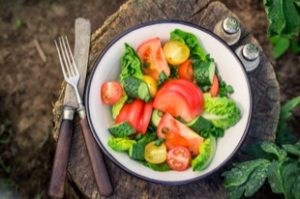Constipation

Constipation is usually defined as if you have a poo less than 3 times a week, or if your poo is hard and lumpy or difficult to push out.
Important note: do see your GP straight away if you notice any unexplained changes to your bowel habits (e.g. your poos are looser or harder than usual, there is blood in your poo), as these could be signs of a serious illness.
Tips for constipation
Diet
To help avoid constipation try to eat more foods that have lots of fibre, and drink lots of water. Good foods to try to include in your diet include: any fresh fruit and vegetables, especially pumpkin and pumpkin seeds. Other good foods are any beans, including baked beans, and oats. Try making porridge or flapjacks (and adding pumpkin seeds to either).
Click here for recipe ideas.
Try to eat slowly and chew your food well.
Salad dressing
Add a salad dressing made out of olive oil and cider vinegar to your salad. Cider vinegar and oils such as olive oil are both old home remedies to treat constipation. The oil helps to lubricate your gut, and the cider vinegar contains pectin, which is a laxative. Try mixing them together to make a tasty salad dressing.
Exercise
Any sort of exercise can really help to keep your bowel moving too. Exercise which involves standing up seems particularly helpful – maybe it is gravity helping the problem along. Try getting up and walking as much as you can, or go for a walk after you have eaten. The link between constipation and exercise isn’t backed up by research evidence, so perhaps it doesn’t work for everyone (although it certainly works for my family), but there is no harm in giving it a try.
Califig
Love this. Tastes disgusting, but a spoonful sorts you out.
Fruit Bowl School bars
I always get blocked up when I go on a long journey, so I take some of these with me to help minimise the problem. They taste OK, are easy to slip in your bag, and have loads of fibre to help keep you moving.
Probiotics
Eating a probiotic yoghurt a day can help improve the levels of good bacteria in your gut. The more good bacteria you have, the more efficiently your gut should be able to work. Examples of probiotic foods include probiotic yoghurt, or fermented foods like pickles, kombucha tea, sauerkraut or miso soup. Unpasteurised cheeses are another great food for the gut, especially parmesan. It may be best to eat probiotic products on an empty stomach to get the best results, so think about having a probiotic yoghurt or miso soup for breakfast. Actimel seems to be the brand of yoghurt that has the most research backing.
Eat prebiotics
In the same way that eating probiotics can help improve your gut bacteria, eating prebiotics can help the bacteria you already have to be more healthy. Foods that are high in prebiotics include garlic, onions and leeks, chicory, bananas, mushrooms and broccoli. Eating more wholegrains generally will also keep your gut bacteria happy.
Drink caffeine or liquorice tea
Caffeine can help to improve constipation, so this is one time where a coffee a day could be good for you. Liquorice tea is also thought to be good for constipation.
Honey and mustard
Honey and crushed mustard seeds mixed with water is an ayurvedic treatment for constipation.
Massage
Try having a massage as another way to improve the movement of food through your gut.
Step stool
The most natural position to do a poo in, is whilst squatting, but in our modern world we sit on the loo. This means that the rectum and anus are not properly aligned, which can make it more difficult to push out your poo. Try keeping a step stool or toddler stool in the loo (or a large pile of books will do too). When you want to do a poo, put the step stool in front of the loo, and rest your feet on it. This will mimic a squat position, and make it much easier to push out that poo.
Make a flaxseed drink
Try soaking a tablespoon of flaxseeds in a cup of water overnight. Drink the whole thing when you wake up for a great homemade (if unpleasant) constipation cure.
See also our general tips for a healthy gut here.
Self-Care
See the NHS Self-Care factsheet here.
